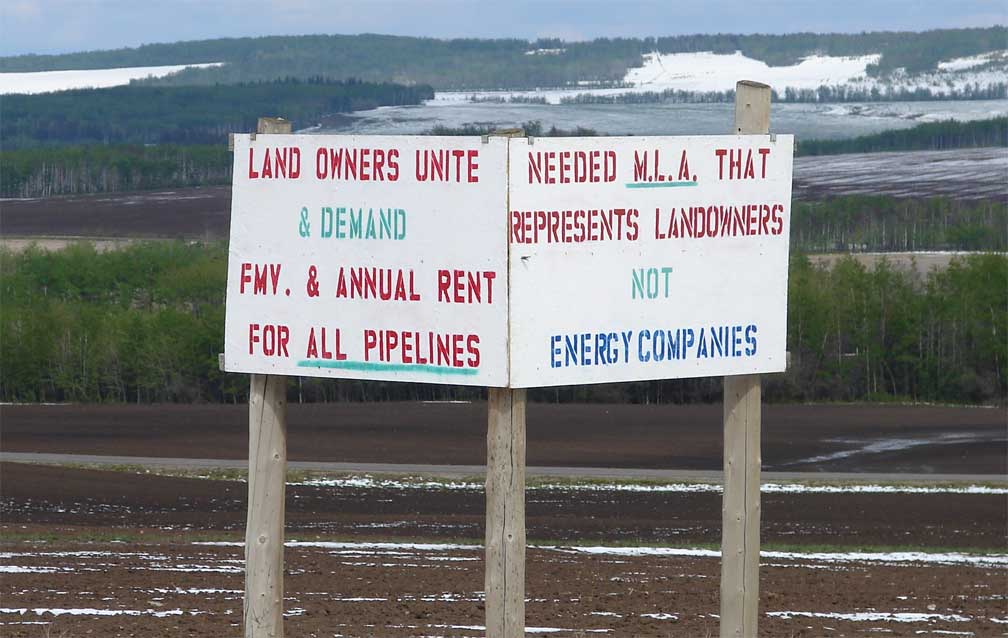|
FRACKING LANDOWNERS -
THE BATTLE OF THE HANDCUFFED - REFORMING LANDOWNER LEGISLATIONS (June
1,
2010)
|
| Integral
to
the
controversial
and
cumulative concerns about the water, the ecology and
the air related to fracking, is the often tragic multi-issue impact on
landowners. According to accounts from hundreds and thousands of sources in the United States and Canada (as reported and found on the web) for many decades provincial, state and federal governments have generally failed to protect the rights and concerns of landowners. Though some may be indirectly and temporarily comforted receiving compensation in the way of money from legal deals made with numerous companies, most are not. Many are frustrated by the obvious lack of and poorly written legislations, which provide loopholes, rights and privileges to often rich and powerful companies and corporations. And in turn, during regulatory processes about pipeline  and related projects,
landowners are often at a disadvantage in hearing structures made
unfriendly towards them (i.e., the recent complaints by the Canadian
Association of Energy and Pipeline Landowner Associations, CAEPLA,
concerning the National Energy Board - see CAEPLA Spring 2010 magazine
- see link below). and related projects,
landowners are often at a disadvantage in hearing structures made
unfriendly towards them (i.e., the recent complaints by the Canadian
Association of Energy and Pipeline Landowner Associations, CAEPLA,
concerning the National Energy Board - see CAEPLA Spring 2010 magazine
- see link below).That's why a number of courageous and independently minded citizens have created landowner associations to, in some way, help create a voice in the proverbial wilderness. Many people who live in urbanized settings don't understand or empathize with what mostly rural landowners face or experience (there are more exceptions to this, as big gas has begun to set up more rigs and PR in urban areas). Here in British Columbia, big oil and gas have been operating mostly in the secluded northeastern part of the province, where the population is largely sparce and spread out. Most other British Columbian's don't understand what has transpired over the last seven years, and don't understand the social and environmental pressures placed upon landowners, and the big political clout industry has, particularly in small, vulnerable communities.  Road-side
sign near Farmington, B.C., between Ft. St. John and Dawson Creek.
Since about 2003, under the current big-company-friendly BC Liberals administration, there began a new pattern by the big gas industry making incursions to private properties in the southern section of the northeast, a pattern that has created enormous angst among landowners. The recent world financial difficulties and drop in beef and cattle market demand in Canada plays into the preying prospects by companies upon landowners in this area. As a large part of lands in the northeast are Crown, or State, owned, lease land sales primarily for gas developments have skyrocketted, and almost all lands showing geological promise in the northeast are now tenured (the land deals are largely done!). Companies/ Corporations, who are provided with carte blanche subsurface rights, are now more and more wanting to exploit the land lease investments they have been provided by the BC government. What landowners are saying, here, and everywhere, is that our Mining and related laws need to be overhauled and reformed to protect landowners and related subsurface rights, and that federally and provincially operated regulatory agencies adopt new measures to provide comprehensive participatory rights and funding avenues to landowners concerned about new and existing energy projects. LINKS - Listening to the Voices of the
Landowners
Canadian
Association of Energy and Pipeline Landowner Associations
http://www.landownerassociation.ca/
(Download their recent Spring 2010, 52-page edition of The CAEPLA Landowner Journal) Here is the opening quote from the nine-page CAEPLA November 14, 2009 letter to the National Energy Board, headquarted in Calgary, Alberta: I am writing to you
today as a follow up to earlier correspondence that CAEPLA has had with
you, and with other senior officials at the National Energy Board
(NEB). My objective is to re-present (as in again present), what we at
CAEPLA have been consistently setting before you as the legitimate
grievances of landowners regarding the entrenched disposition and
systemic discrimination practiced against landowners by the regulatory
entity over which you preside.
In the past, CAEPLA has laboriously and carefully made senior NEB officials aware of these conditions, only to see the knowledge of our statements and petitions restricted to a small group of industry insiders and NEB employees. Unlike these previous presentations, the information contained in this letter will be widely distributed. The objective in doing so is to ensure that an ever-widening group of individuals, including decision makers and those who shape policy, are familiar with the facts, and therefore will recognize the regulatory capture that defines the operations of the NEB, and the systemic disadvantages that landowners must therefore constantly face at its hands. As you know, this week the NEB is holding a technical conference related to the Land Matters Consultation Initiative (LMCI) process. The outcome may well affect landowners for years to come. As the largest voluntary landowner association in the country, CAEPLA recognizes that it should be involved in this process. Indeed, CAEPLA wants to be involved, and realizes that we should be there presenting in a constructive and forthright fashion the legitimate and well thought through positions of the many thousands of landowners that CAEPLA now represents.  Yet due to the manner in which the NEB has quite deliberately set up a process that knowingly puts landowners at a structural disadvantage, we recognize that we have been crowded out of the process. As
of
late
January of this year, the individual who is ultimately
responsible for the NEB’s behaviour, is Christian Paradis, the new
Minister of Natural Resources. Due to intransigence by the NEB’s top
bureaucrat, landowners are calling on the minister to step in and
address the issues of secrecy, industry favouritism, and the systemic
trampling of legitimate landowner interests. (Quote and photo
from CAEPLA Spring 2010 Magazine)
United States
Sandal's Natural Gas Journal - http://www.pagaslease.com/journal_mp3_dsblk_04-30-2009.php West Virginial Surface Owners Rights Organization - http://www.wvsoro.org/ |